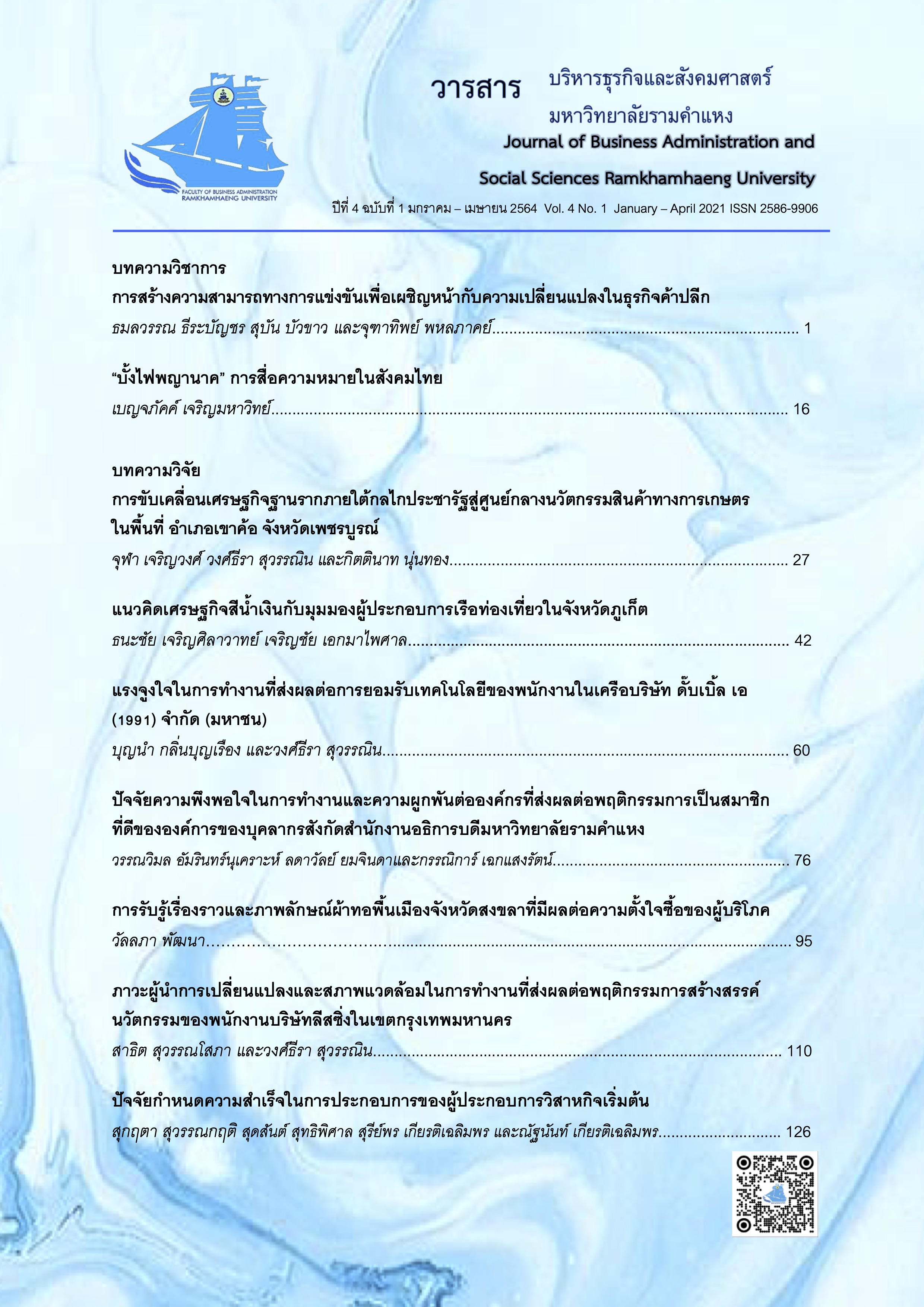Determinant Factors of Success Startup Entrepreneurs
Main Article Content
Abstract
This research paper aimed to study the effects of Government Support, Knowledge of Entrepreneur, Capital Assessment Competencies, and Organization Innovation on Success Factors of Startup Entrepreneur. Quantitative method and hierarchical regression analysis have been employed to analyze the data from 689 participants in the Startup Entrepreneur Promoting Project by The Government Savings Bank, during December 2017 until December 2018.
The research findings showed Knowledge of Entrepreneur, Capital Assessment Competencies, and Organization Innovation effect to the success of Startup Entrepreneur significantly (p < 0.05). Knowledge of Entrepreneur, Capital Assessment Competencies and Organization Innovation were good predictors for success of Startup Entrepreneur. Variables accounted for 60.1% of total variance in success of Startup Entrepreneur.
Article Details
เนื้อหาและข้อมูลในบทความที่ลงตีพิมพ์ในวารสารบริหารธุรกิจและสังคมศาสตร์ มหาวิทยาลัยรามคำแหง ถือเป็นข้อคิดเห็นและความรับผิดชอบของผู้เขียนบทความโดยตรง ซึ่งกองบรรณาธิการไม่จำเป็นต้องเห็นด้วย หรือร่วมรับผิดชอบใดๆ
บทความ ข้อมูล เนื้อหา รูปภาพ ฯลฯ ที่ได้รับการตีพิมพ์ในวารสารบริหารธุรกิจและสังคมศาสตร์ มหาวิทยาลัยรามคำแหง ถือเป็นลิขสิทธิ์ของวารสารบริหารธุรกิจและสังคมศาสตร์ มหาวิทยาลัยรามคำแหง หากบุคคลหรือหน่วยงานใดต้องการนำบทความทั้งหมดหรือส่วนหนึ่งส่วนใดไปเผยแพร่ต่อ หรือเพื่อกระทำการใดๆ จะต้องได้รับอนุญาตเป็นลายลักษณ์อักษรจากวารสารบริหารธุรกิจและสังคมศาสตร์ มหาวิทยาลัยรามคำแหง ก่อนเท่านั้น
References
กรมประชาสัมพันธ์. (2559). ความสำเร็จที่ยิ่งใหญ่ของสตาร์ทอัพไทย. จดหมายข่าวรัฐบาลเพื่อประชาชน, 2(27), 1.
นวรัตน์ ชนาพรรณ. (2550). การศึกษากลยุทธ์ในการดำเนินงาน ภูมิความรู้ความชำนาญ เชาว์เชิงปฏิบัติและความสำเร็จในการประกอบการธุรกิจอาหารแช่แข็งกลุ่มผลิตภัณฑ์จากสัตว์น้ำ. วิทยานิพนธ์ศิลปศาสตรมหาบัณฑิต, มหาวิทยาลัยธรรมศาสตร์.
นุตประวีณ์ เลิศกาญจนวัติ และคณะ. (2554). ธุรกิจและการเป็นผู้ประกอบการ. กรุงเทพฯ: ศูนย์ส่งเสริมวิชาการ.
พิชญา มัชฌิมศรัทธา. (2554). บุคลิกการเป็นผู้ประกอบการ ภูมิความรู้ ความชำนาญ ทักษะการจัดการทรัพยากรใหม่ และความสำเร็จในการประกอบธุรกิจของผู้ประกอบการโรงแรมอิสระในเขตกรุงเทพมหานคร. วิทยานิพนธ์ศิลปศาสตรมหาบัณฑิต, มหาวิทยาลัยธรรมศาสตร์.
พิมพ์นารา หิรัญกสิ. (2564). บทบาทของหลักประกันในการขอสินเชื่อ ในภาคธนาคารยุคใหม่. สืบค้นเมื่อ 26 เมษายน 2564 จาก https: // https://www.krungsri.com/th/research/research-intelligence /ri-collateral-2021.
พวงรัตน์ ทวีรัตน์. (2540). วิธีการวิจัยทางพฤติกรรมศาสตร์และสังคมศาสตร์. กรุงเทพมหานคร : สำนักทดสอบทางการศึกษาจิตวิทยา มหาวิทยาลัยศรีนครินทรวิโรฒประสานมิตร.
สมาคมการค้าเพื่อส่งเสริมผู้ประกอบการเทคโนโลยีรายใหม่. (2559). รายงานการศึกษาปัจจัย และข้อเสนอแนะ เพื่อพัฒนา Startup Ecosystem ในประเทศไทย. สืบค้นเมื่อ 21 เมษายน 2563, จาก https://docs.google.com/viewer?a=v&pid=sites&srcid=ZnRpa20uY29tfGRlbW9rbXxneDoxOTBmYjBjNGI2NDYwYmNh
สำนักนโยบายการออมและการลงทุน สำนักงานเศรษฐกิจการคลัง. (2559). การประชุมคณะกรรมการส่งเสริมวิสาหกิจเริ่มต้นแห่งชาติครั้งที่ 1/2559. สืบค้นเมื่อ 1 พฤษภาคม 2563, จาก https://www1.mof.go.th/home/Press_release/News2016/041.pdf
Barari, R. (2015). The effect role of knowledge management on organizational innovation in University of Iran. International Journal of Educational and Psychological Researches, 1(2), 87-95.
Bullinger, H. J., Bannert, M., & Brunswicker, S. (2007). Managing innovation capability in SMEs: The Fraunhofer three-stage approach.Tech Monitor, 5, 17-27.
Burnett, (2010). Getting in shape for the “Long Run”. Retrieved April 9, 2010, from http://www.choosealbany.com/news/SBDA%20programs.pdf
Choo, S., & Wong, M. (2006). Entrepreneurial intention: triggers and barriers to new venture creations in Singapore. Singapore Management Review, 28(2), 47-64.
De Tienne, D. R., & Chandler, G. N. (2004). Opportunity identification and its role in the entrepreneurial classroom: A pedagogical approach and empirical test. Academy of Management Learning & Education, 3(3), 242-257.
Honig, B. (2004). Entrepreneurship education: Toward a model of contingency-based business planning. Academy of Management Learning & Education, 3(3), 258-273.
Husain, I. (2003). Banking sector: Developments, challenges and opportunities. Retrieved December 8, 2008, from http://www.ishrathusain.com/speeches/financialsector/2003/Banking_Sector_
development_challenges_and_Opportunities.pdf
Isaac, O., Masoud, Y., Samad, S., & Abdullah, Z. (2016). The mediating effect of strategic implementation between strategy formulation and organizational performance within government institutions in Yemen. Research Journal of Applied Sciences, 11(10), 1002-1013.
Jiménez-Jiménez, D., & Sanz-Valle, R. (2011). Innovation, organizational learning, and performance. Journal of Business Research, 64(4), 408-417.
Kim, W. C., & Mauborgne, R. (2005). Blue Ocean Strategy: How to Create Uncontested Market Space and Make the Competition Irrelevant. Boston, MA: Harvard Business School.
Kouriloff, M. (2000). Exploring perceptions of a priori barriers to entrepreneurship: A multidisciplinary approach. Entrepreneurship Theory and Practice, 25(2), 59-80.
Marcusevans Conferences. (2008). 3rd. annual SME banking & financing: A step forward. Retrieved October 15, 2008, from http://www.micpa.com.my/micpamember/document
/SME2008.pdf
Naala, M. I. N., Nordin, N., & Omar, W. A. W. (2017). Innovation capability and firm performance relationship: A study of pls-structural equation modeling (Pls-Sem). International Journal of Organization & Business Excellence, 2(1), 39-50.
Peterman, N. E., & Kennedy, J. (2003). Enterprise education: Influencing students’ perceptions of entrepreneurship. Entrepreneurship Theory and Practice, 28(2), 129-144.
Pletcher, C., & Mann, R. (2013). Innovation Levers: Keys to Business Success in a Difficult Economy. Retrieved December, 12, 2019, from https://www.sopheon.com/innovation-levers-keys-business-success-difficult-economy/
Radzi, K. M., Nor, M. N. M., & Ali, S. M. (2017). The impact of internal factors on small business success: A case of small enterprises under the FELDA scheme. Asian Academy of Management Journal, 22(1), 27.
Schumpeter, J. A. (1934). Change and the entrepreneur. Essays of JA Schumpeter, 4(23), 45-91.
Straub, J. T. & Attner, R. F. (1994). Introduction to Business (5th ed.). Belmont, CA: Wadsworth.
Van de Vrande, V., De Jong, J. P., Vanhaverbeke, W., & De Rochemont, M. (2009). Open innovation in SMEs: Trends, motives and management challenges. Technovation, 29(6-7), 423-437.


